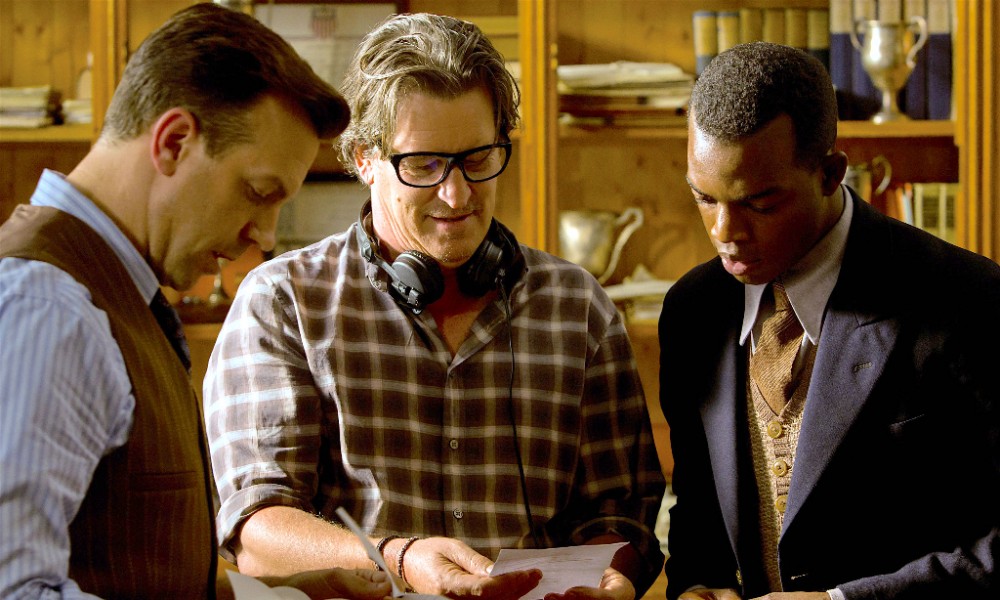Race: An interview with director Stephen Hopkins

Uplifting biopic Race opens in UK cinemas this June, documenting the life of international track star Jesse Owens. We caught up with director Stephen Hopkins to discuss the inspiration for the film and its relevance in the melee of current race relations.
Race is very different from your other projects – the early dark movies like Judgement Day and your thrilling TV work. What prompted you to make this change?
Over the years I’ve done a lot of different things; I tried a lot of different stuff, like TV. When I looked into Jesse’s life story it was such a big topic that I didn’t think it would fit in the film. He was initially the first ever worldwide superstar and the Nazis made that happen. I wanted to tell the story of those three years: how he wanted to run to feel free but became caught up in the politics.
Jesse Owens is obviously a historical figure, both in the athletic world and black history. Was it a difficult film to make and why?
Yeah it was pretty scary. I told all the actors “Please tell me if I’m being a terrible white film director here.” It’s an African-American story but over the years I have looked into the culture and I was born in Jamaica and grew up here. There’s something about that struggle that doesn’t ever seem to go away in the world. It’s not just about African-American racism; it’s also about anti-Semitism and really the idea of racism in itself. There’s something about human nature that wants to separate and find a reason to blame someone else.
How important do you think a film like this is in the context of today’s race relations?
I didn’t want to betray the person Jesse was. He made mistakes, he became arrogant once he became successful, ran away with a socialite when he was engaged. He did a lot of things, and his family said “we didn’t want to show this”, but that shows he’s not a real person: you’ve got to be someone who went through stuff. When I read the book, one thing that stood out in my mind was that he didn’t know who he was running for. Was he running for America, which was a segregated society?
Did any movies in particular inspire you in the process of making this one?
It was really hard to find any. It’s an odd genre – there are not a lot of sport films. Obviously Chariots of Fire, even if it’s different. I never found a film to use as template; it’s an unusual series. It’s the truth.
From the production point of view, what were the biggest challenges?
We didn’t have a huge budget – we got a lot of people to work hard, got a lot of friends involved. It was fantastic to go to Berlin, in a real place, a real stadium. Not a lot of Berlin is still standing; it was fun to do that. Also, short schedules… all those usual excuses. It was hard to cast the film. I found Stephen early though, he reminded me so much of Jesse.
Was it difficult as a white man to tackle and explore the topic of racism?
I don’t know, I think I feel like a well-educated person in this area – I’ve spent a lot of time in Africa to observe. Sometimes it’s not bad to step outside the culture and view it from another perspective. It was a film about corruption and African Americans in that time. I knew a lot about it. I hope I didn’t screw it up.
Is there anything you would change, or anything that you were unhappy about?
I would love to have spent more time with Jesse’s life before it started, more about where he came from and what happened after this. I‘d love to do a prequel and sequel to Race. He went through so much, his life was extraordinary.
Obviously racism and race are the overt themes of the film. What other themes did you try to explore?
His heroism is interesting to me. I think in some ways how things have changed is extraordinary.
Social media has sort of become a platform for protest and shedding light on social issues. Do you think the world of film and television also has that ability?
I guess they always have – social media is a recent event, in the last 20 years. I liked it when I was young when songs would be about things other than touching my body. It’s not mainstream any more to protest about things.
What advice would you give to someone aspiring to be a film director…or even maybe an athlete?
For an athlete you’ve got to start young, you don’t have to with films. You can get the technology to do whatever you want; being athlete is a state of mind. A vocation. To get up and train every day. You can’t give up, even till the very end.
Aisha Mohamed
Photos: Jamie McCarthy/Getty Images
Race is released nationwide on 3rd June 2016.
Read our review of Race here.

























Facebook
Twitter
Instagram
YouTube
RSS